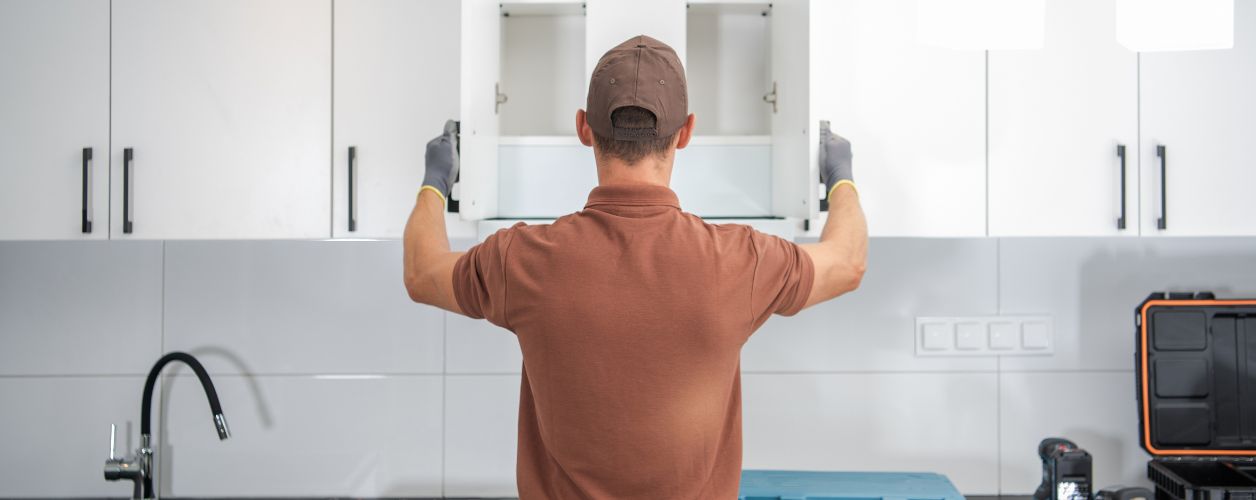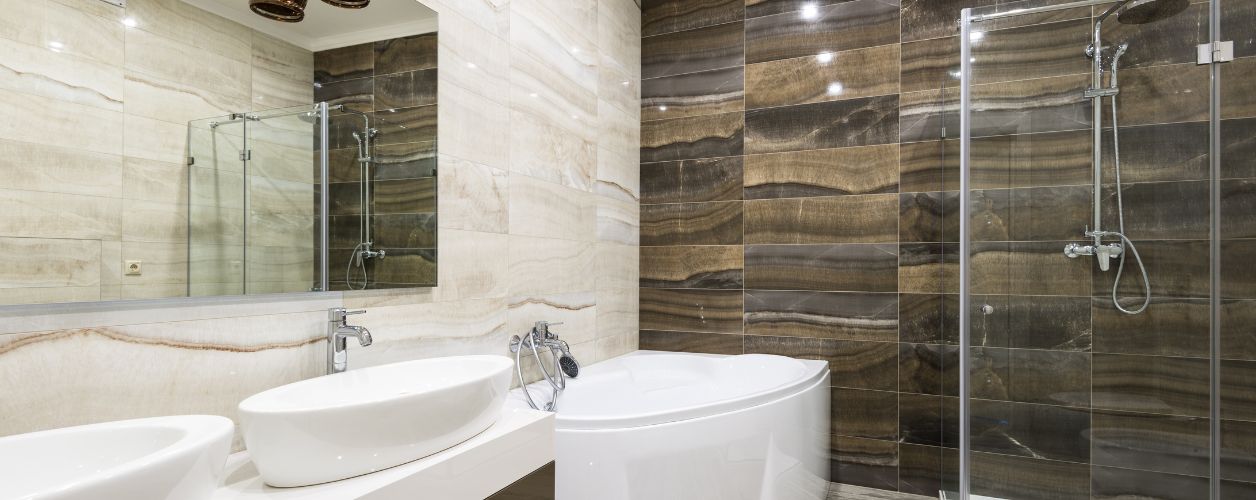Get free quotes within minutes
Modular vs Custom Kitchens: Which One Is Better?

Table Of Contents
- Introduction
- Modular Kitchens
- Custom Kitchens
- Choices And Differences in Modular and Custom Kitchens
- Customization Options of Cabinets
- Time to Finish the Kitchen
- Which Kitchen Is Suitable for You?
- Final Thoughts
Confused between a modular kitchen and a custom-built one? Let’s explore the pros, cons, and costs to help you choose the perfect fit for your home
We all want the ideal kitchen, don't we? Thus, some design choices are necessary. It has a big impact on how you live your life, how you store things, how you use your space, and how your home appears. Modular kitchens and custom kitchens are two of the most popular choices. Depending on urgency, need, and financial constraints, they have advantages and disadvantages.
Let’s explore modular and custom kitchens. Find out what makes them different, and discover which one best suits your needs.
Modular Kitchens
Modular kitchens use pre-made units called modules. These units come in fixed sizes. You can arrange them in many layouts. The units include cabinets, countertops, and even spaces for appliances. Carpenters or joiners assemble them on-site after the factory produces them.
These kitchens provide design versatility in a common range. You have a range of configurations to choose from, such as L-shaped, U-shaped, straight-line, or galley. The emphasis is on quick installation and efficient space utilization.
Modules are similar to building blocks. You can interchange them. You have nice style, storage, and functionality without waiting for extended periods.
What Are Modular Kitchen Cabinets?
Modular kitchen cabinets are pre-fabricated. Factories make them in standard sizes and finishes. These cabinets come in different types, like wall cabinets, base cabinets, tall pantry units, and corner cabinets.
Homeowners can choose a layout that works best. These cabinets fit well into modern kitchen designs. Their modular nature makes it easy to add or change units in the future.
These are simple to move, fast to set up, and cheaper than custom. But they take pre-set designs. You have the choice of many, but there is little room for customization.
Custom Kitchens
Custom kitchens are custom-built. Designers create them to the precise size and shape of your kitchen. It begins with your vision. You sit with a designer and select materials, colors, finishes, and layout. All of the details are determined by your requirements.
These kitchens never employ pre-assembled units. Employees construct the entire thing from scratch. The design is done according to the shape, corners, or height of your kitchen. The result is a fully customized kitchen that perfectly fits your space.
Endless design flexibility is provided by custom kitchens. You can pick anything from the size of cabinets to the hardware finish. That amount of freedom results in a luxury feel and total control of the final appearance.
What Are Custom Kitchen Cabinets?
Custom kitchen cabinets are built from scratch. A cabinetmaker or carpenter constructs them to fit your kitchen's precise measurements. These cabinets can be fitted in any space, however unusual or small.
You can select each detail. That includes the type of wood, color of paint or stain, depth of the cabinets, and door type. If your kitchen has high ceilings or difficult corners, custom cabinets have no problem with them.
These cabinets require more time to construct. But they provide greater use of space and better quality. You also receive a design that fits your style perfectly.
Choices And Differences in Modular and Custom Kitchens
Modular kitchens have set designs. You can choose from numerous combinations, but you operate within constraints. Cabinets and finishes are catalog-based. This reduces lead time and accelerates the process.
Custom kitchens begin from scratch. You design the layout and appearance from the ground up. You have control over the colors, finishes, shapes, and materials. You can even match existing furniture or home decor.
If most important to you is design freedom, custom kitchens are the superior option.
Arrangement Flexibility
Modular kitchens are effective for typical designs. If your kitchen is a square, a rectangle, or an L-shaped one, the modular units will suit you. Modular kitchens adhere to pre-determined forms. Cabinet sizes cannot be altered much.
Custom kitchens allow total layout freedom. Designers can fit cabinets under beams or around pillars. You can extend cabinets to the ceiling or add built-in shelves and drawers.
Custom kitchens offer full space optimization. Modular kitchens are easy but have less flexibility in design.
Installation Process
Modular kitchens are installed rapidly. Because the cabinets are preconstructed, the installation is merely assembly. Employees take a couple of days to finish the assembly. This accommodates homeowners who require a speedy renovation.
Custom kitchens are more time-consuming. Every cabinet is manufactured once the design is completed. Employees tend to construct cabinets on-site. Then, countertop fabricators measure and come back to install the surface.
The process takes a few weeks. It requires more time and effort but yields a high fit and finish.
Cost of Modular Kitchens
Modular kitchens are cheaper. Their cost varies based on material, size, and design. On average, a modular kitchen in the USA ranges from $1,000 to $15,000. Therefore, they suit those with a stringent budget.
Mass production reduces cost. Factories produce these units in bulk, and so labor as well as material costs decrease. Installation is also quicker and less expensive.
These kitchens provide a contemporary appearance at little cost.
Cost of Custom Kitchens
Custom kitchens are expensive. Each detail contributes to the cost. The cost range begins in the vicinity of $15,000 and could easily exceed $50,000 based on material, size, and design.
Custom designs incorporate top-quality materials and skilled craftsmanship. Builders make every cabinet to specifications. They invest more time in planning and installing. The outcome is a high-end kitchen that has a longer lifespan.
If possible, custom kitchens are worth the investment in the long run.
Material Quality and Durability
Modular kitchens employ cost-effective materials. Most employ plywood, MDF, or particleboard. These materials are suitable for average wear and tear. They provide adequate durability at a reduced cost.
Custom kitchens employ more durable materials. Solid wood, marine plywood, and other long-term alternatives can be used. It enhances strength and durability. Custom finishes are also scratch-, stain-, and moisture-resistant.
Custom kitchens remain functional for a longer time. Their quality and craftsmanship ensure that they look like new for several years.
Longevity and Maintenance
Modular kitchens are long-lasting but have some limitations. Modular kitchens can tire more quickly when using them extensively. It is straightforward to replace affected units, though modular components would not always work with older modules.
Custom kitchens provide long-lasting performance. Modular kitchens perform activities of daily living better. Well-maintained custom kitchens take decades. Modular parts age contemporaneously, which means color and design stay cohesive.
It's simpler to maintain both of them if you opt for quality material. However, custom kitchens remain better throughout life.
Kitchen Functionality and Appliance Integration
Modular kitchens have provisions for average-sized appliances. If your appliances are typical sizes, modular cabinets will suit you.
Custom kitchens provide improved appliance integration. If you have large or special appliances, custom designs can fit them. You can include built-in ovens, deep drawers, or concealed garbage cans.
Personalized kitchens enhance kitchen operations. Everything is suited to your routines and equipment.
Customization Options of Cabinets
Modular cabinets have fixed sizes. You can pick the style of the doors, the color, and the handle. However, in-depth customization may not be achievable.
Custom cabinets permit unlimited options. You can include pull-out trays, spice racks, dividers, and lighting. Each shelf and drawer can be tailored to your requirements. You can also coordinate the color of the cabinet with the wall paint or the flooring.
This degree of attention to detail assists in making a kitchen feel personal and functional.
Prefab Cabinets vs. Custom Cabinets
Stock or prefab cabinets are produced in bulk. They are less expensive and faster to install. However, they may not suit every kitchen perfectly. Gaps, improper alignment, or wasted space can result.
Custom cabinets are designed to fit perfectly. No wasted space, no peculiar gaps. All of the space in your kitchen is utilized. This creates a sleek and efficient design.
Prefab cabinets suit temporary or rental houses. Custom ones are best for permanent dwellings.
Time to Finish the Kitchen
Modular kitchens are quicker. They are mostly done in one to three weeks. They are appropriate for projects with tight schedules.
Personalized kitchens are time-consuming. The design, construction, and installation can take one to three months. But the end product is your dream.
Speed is the most important factor when selecting between the two. Go custom for quality. Go modular for speed.
Which Kitchen Is Suitable for You?
Select modular kitchens for quick delivery and a relatively low price tag. They suit apartments, rentals, or first-time homeowners' projects. They provide a sleek look with minimal waiting.
Choose custom kitchens if you value style, quality, and precision. They work best in forever homes or high-end renovations. If design is your top priority, choose custom.
Your kitchen choice depends on your needs, budget, and timeline.
Final Thoughts
Modular and custom kitchens accomplish the same thing. But they have different ways of getting there. Modular kitchens offer fast, economical solutions. They emphasize ease, speed, and plain function. Custom kitchens provide unlimited design freedom. They provide you with control, quality, and a lasting outcome.
Consider your kitchen area, how much money you have to spend, and how quickly you need the work completed. Then select the one that best aligns with your objectives. Your kitchen should be yours. Select the one that assists you in getting there.
YOU MIGHT ALSO BE INTERESTED IN

20+ Small Bathroom Design Ideas to Maximise Space & Style







